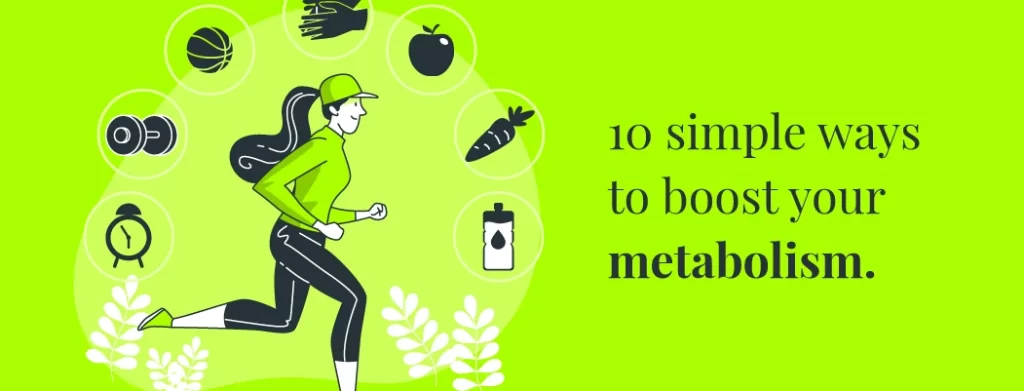
General description
The term “metabolism” describes the body’s chemical reactions as it transforms food and fluids into energy. Energy is produced and released through a complicated mechanism that mixes calories and oxygen. This energy fuels the body’s processes.
The functions of your metabolism
Even when your body is at rest, your metabolism continues to function. Continuously supplies energy for fundamental body processes such as:
Breathing
circulating blood
food digestion
Cells growing and repairing.
Control of hormonal levels.
Regulate body temperature
Natural way to improve metabolism
It is possible to increase your metabolism quickly with several simple and efficient techniques, many of which only require minimal diet and lifestyle changes.
Work the muscle
Even when you’re not doing anything, your body continually burns calories. As a result, people with more muscle have substantially higher resting metabolic rates. While each pound of fat only burns two calories a day, each muscle needs approximately 6 calories a day to maintain itself. Over time, even a modest difference could add up. For example, the muscles in your body are activated after a strength training exercise, increasing your metabolic rate daily.
eat enough
To lose weight quickly, some people reduce their caloric intake. However, eating less is a myth because your body can lose muscle if you don’t eat enough calories. To save energy for essential processes, your body also slows down calorie burning when you eat less. To burn extra calories, eat a nutritious diet and exercise.
Eat frequently and normally
Your metabolic rate increases briefly after eating due to the digestion process. With this in mind, it makes sense to eat short, light meals every three to four hours. Long periods between meals can deprive your body and cause a calorie deficit. Plus, leaving too much time between meals will eventually slow down your metabolism. However, you must be careful when making your decisions because they affect the number of calories you eat. Remember to consume enough protein in your diet because, according to studies, it not only helps muscle growth but also requires the most calories to be digested of all the nutrients.
Reduces stress
The stress hormone cortisol is produced due to continuous stress. Our appetite is also controlled by cortisol. Therefore, an increase in stress levels can directly affect the amount of food we eat and slow down our metabolism.
Use meditation to help you relax. A quick walk in the park or doing your favorite hobby can also help reduce tension. Find out which exercises work best to reduce stress.
Get enough sleep
Sleeping well is directly related to our metabolic rate, according to research. A fast metabolism is a sign of good sleep, while a slow metabolism is a sign of bad sleep.
Inadequate sleep also interferes with the release of certain hormones. For example, it has a detrimental effect on ghrelin (the hunger hormone) levels.
This has a detrimental effect on metabolism and can lead to eating disorders. Although everyone needs a different amount of sleep, multiple studies have found that most adults should get at least 7 hours of sleep each night.
Add flavor to your meals
Spicy foods contain natural compounds that can speed up your metabolism. For example, cooking with a tablespoon of chopped red or green chili can increase your metabolic rate. Although the effect is temporary, eating spicy foods frequently can have long-term benefits. Add red pepper flakes to stews, chili, and pasta recipes for a quick boost.
Include protein-rich foods at every meal
Compared to the breakdown of carbohydrates and fats, proteins require more energy from the body. The thermic effect of eating is the result of this increased metabolism. Eating a lot of protein has been shown to speed up metabolism and significantly improve caloric expenditure. Protein also promotes satiety, which reduces hunger cravings and subsequent overeating.
Nutrition
Foods that can increase your metabolic rate should be part of a regular diet. Avocado, red fruits (rich in antioxidants), pineapple, kiwi, lemon, ginger, cinnamon, grapefruit, dairy products (rich in proteins), fish, eggs, lentils, apples, dairy products (rich in proteins), etc. exercise regularly and eat a nutritious diet.
Drink some black coffee
If you drink coffee, you will appreciate the benefits of your energy and concentration. A temporary increase in your metabolic rate may be one of the advantages of consuming coffee in moderation. Plus, when you exercise, caffeine can make you feel less exhausted and improve your endurance.
Recharge energy with green tea
The benefits of caffeine and catechins, which have been shown to boost metabolism for a couple of hours, can be obtained by drinking green or oolong tea. According to research, consuming 2 to 4 cups of tea can stimulate the body to burn 17% more calories during a short period of moderately strenuous exercise.
strength training
Maintaining and even gaining muscle mass is possible with strength training. You will burn more calories throughout the day if you have more muscle mass. You can increase your muscle mass and speed up your metabolism by lifting weights, carrying heavy objects, or doing other exercises with weights on your body. However, your body also needs extra energy to maintain muscle mass. Compared to a pound of fat, which only requires two calories a day, each pound of muscle in your body needs approximately six calories a day. There are numerous methods to build muscle.

